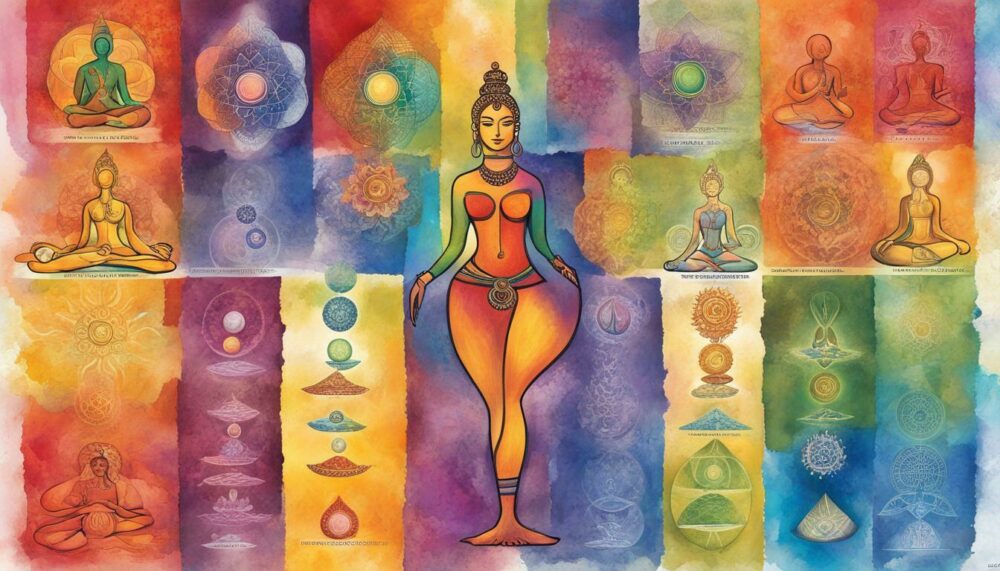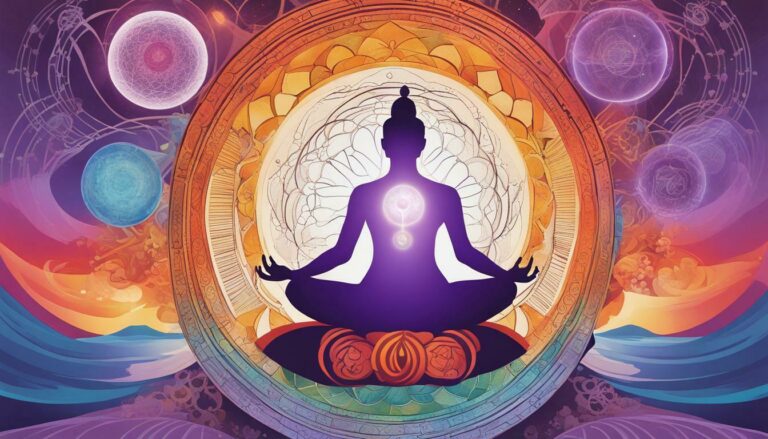Uncovering Which Chakra is for Mental Health: An Insightful Guide
Welcome to this insightful guide that explores the connection between chakras and mental health. Have you ever wondered why your mood, emotions, and thoughts can affect your physical health? The chakra system offers a framework for understanding the mind-body connection and how to achieve holistic well-being.
The chakra system is an ancient concept that originates from Indian spiritual traditions and describes energy centers in our spiritual anatomy. There are seven main chakras aligned along the spine, each with its unique characteristics that influence our emotional and psychological well-being. Understanding the chakra system can provide valuable insights into how to promote mental health and balance.
Table of Contents
Key Takeaways:
- The chakra system is an ancient concept that describes energy centers in our spiritual anatomy.
- There are seven main chakras aligned along the spine that influence our emotional and psychological well-being.
- Understanding the chakra system can provide valuable insights into how to promote mental health and balance.
Understanding the Chakra System
Welcome to the world of chakras, the energy centers of the body that constitute the spiritual anatomy. The chakra system is an ancient Eastern philosophy and has been gaining popularity in the West for its numerous benefits to overall health and well-being. The word chakra comes from the Sanskrit word meaning “wheel,” and it refers to the spinning vortexes of energy that run along the spine.
The chakra system comprises seven main chakras, each connected to different physical, emotional, and psychological aspects of our being. These energy centers are located at specific points along the spine, starting from the base and ascending to the crown of the head.
Understanding the chakra system is crucial to achieving holistic wellness. When the chakras are balanced, energy flows through them freely, promoting physical, emotional, and spiritual harmony. However, if a chakra is blocked or imbalanced, it can cause physical and emotional distress, leading to various health issues.
Let’s dive deeper into each of the seven main chakras and explore their unique qualities, characteristics, and relevance to our overall health and well-being.
The Root Chakra and Mental Stability
You might be surprised to know that your mental stability is closely linked to the root chakra. This chakra, also known as the Muladhara chakra, is located at the base of your spine and governs your basic survival needs, such as food, shelter, and safety. When this chakra is balanced, you feel grounded, secure, and stable in your life.
However, imbalances in this chakra can lead to feelings of anxiety, fear, and insecurity, which can have a profound impact on your mental health. The good news is that there are several practices to restore balance to the root chakra and promote mental stability.
| Practices for Root | Benefits |
|---|---|
| Grounding exercises: Walking barefoot on the earth, standing in tree pose, and practicing yoga can help you connect with the earth’s energy and promote feelings of stability and security. | Reduced anxiety and stress, increased feelings of groundedness. |
| Aromatherapy: Using essential oils such as cedarwood, patchouli, and vetiver can help calm the mind and promote feelings of security and stability. | Reduced anxiety and stress, improved sleep. |
| Meditation: Focusing on the root chakra during meditation and visualizing a red, grounding light can help restore balance to this chakra and promote mental stability. | Reduced anxiety and stress, increased feelings of groundedness. |
By incorporating these practices into your daily routine, you can nurture your root chakra and cultivate a sense of grounding and stability in your life. Remember, a healthy root chakra is essential for your mental well-being.
The Sacral Chakra and Emotional Well-being
As you continue to explore the power of chakras in promoting mental health, it’s time to take a closer look at the sacral chakra. This energy center is located in the lower abdomen and is associated with emotional well-being and creativity.
A balanced sacral chakra allows for the free flow of emotions and promotes a sense of joy and pleasure in life. Imbalances in this chakra can lead to feelings of guilt, shame, and fear, which can negatively impact your mental health.
To restore balance to the sacral chakra and enhance your emotional well-being, consider practicing the following:
- Journaling: Writing down your emotions and thoughts can help release any pent-up feelings and promote their healthy expression.
- Engaging in creative activities: Activities like painting, dancing, singing, or other forms of art can help stimulate the sacral chakra and promote emotional balance.
- Practicing mindfulness: Being present in the moment and practicing mindfulness can help you connect with your emotions and promote their healthy expression.
By prioritizing your sacral chakra and embracing your creativity and emotions, you can experience a greater sense of emotional harmony and overall mental well-being.
The Solar Plexus Chakra and Self-confidence
You are the captain of your ship, the master of your destiny. Your solar plexus chakra represents your personal power and self-confidence. When this chakra is in alignment, you feel empowered and able to take on any challenge that comes your way. Your sense of self-worth and confidence are at an all-time high, and you radiate positivity and enthusiasm.
On the other hand, an imbalanced solar plexus chakra can lead to low self-esteem, lack of motivation, and a feeling of powerlessness. You may doubt your abilities and hesitate to take action, fearing failure or rejection. But fear not, for there are ways to restore balance to your solar plexus chakra and reclaim your personal power.
To strengthen your solar plexus chakra, focus on cultivating a strong sense of self-worth and confidence. Surround yourself with positive affirmations and motivational quotes to inspire and uplift you. Practice visualization exercises, imagining yourself accomplishing your goals and feeling unstoppable. Engage in physical activities such as yoga or martial arts to release any pent-up energy and increase your feelings of strength and power.
The Heart Chakra and Emotional Healing
When it comes to emotional healing, there’s no chakra quite as important as the heart chakra. Located in the center of your chest, this chakra is associated with love, compassion, and empathy. When your heart chakra is balanced, you feel a sense of inner peace and joy, which can greatly improve your overall mental health.
But when your heart chakra is blocked or imbalanced, you may experience feelings of loneliness, sadness, or anxiety. You might struggle to connect with others, or have a hard time expressing your emotions. Luckily, there are many practices you can use to balance your heart chakra and promote emotional well-being.
One powerful technique is to meditate on love and compassion. Find a quiet place where you can sit comfortably and focus your attention on your heart. Imagine a bright green light radiating from your chest, filling your body with love and warmth. As you breathe in, imagine that light growing stronger and brighter. As you breathe out, imagine that light expanding to encompass everything and everyone around you.
You can also practice acts of kindness and generosity to open your heart chakra. Volunteer your time, donate to a charity, or simply perform small acts of kindness for the people in your life. By spreading love and compassion, you’ll not only feel better mentally but also contribute to a more positive world.
Remember that emotional healing is a journey, and it may take time and practice to fully open and balance your heart chakra. But by focusing on love, compassion, and empathy, you can cultivate a deep sense of inner peace and joy.
The Throat Chakra and Expressive Communication
Your throat chakra is the fifth energy center in your spiritual anatomy, located in your throat region. This chakra is fundamental in regulating your expressive communication and self-expression. When balanced, your throat chakra enables you to communicate with clarity, confidence, and authenticity, promoting healthy relationships and constructive interactions with others. By contrast, an imbalanced throat chakra can lead to poor communication, self-doubt, anxiety, and frustration.
To support the alignment of your throat chakra and enhance your expressive communication, you can try specific practices. Vocalization is a potent way to activate your throat chakra and release any blockages. You can start by chanting, humming, singing, or speaking affirmations aloud. To elevate your vocalization practice, you can also try throat chakra yoga poses like shoulder stand and fish pose.
You have the power to communicate your truth with confidence and grace.
Another practice to balance your throat chakra is to embrace your creative expression. Engage in activities that resonate with your passions, whether that is writing, painting, dancing, or playing music. Allow yourself to express your emotions, thoughts, and beliefs through your chosen medium freely. By doing so, you stimulate the flow of energy in your throat chakra, enhancing your self-expression and your mental health as a whole.
Lastly, practice active listening to promote the equilibrium of your throat chakra. Genuine communication is not just about speaking your truth; it is also about listening attentively to others. When you listen to others, you foster empathy, compassion, and respect for their perspectives, improving your communication skills overall. Active listening also helps you recognize and address any communication barriers that arise, enabling you to communicate your truth with efficacy.
Conclusion
Congratulations on taking the first step towards understanding the incredible power of chakras in promoting mental health and well-being. Through this guide, you have gained insightful knowledge about the chakra system and how it relates to our overall health.
Remember, each chakra plays a crucial role in supporting our emotional and psychological well-being. When one or more chakras are imbalanced, it can often result in negative mental health outcomes.
Embrace Chakra Healing for Holistic Well-being
However, with the help of , you can restore balance and enhance positivity, joy, and emotional harmony in your life. By incorporating practices such as meditation, yoga, sound healing, and crystal therapy, you can explore and embrace the power of chakra alignment for holistic well-being.
Stay curious and open to new experiences and embrace your journey towards self-discovery and inner healing. We hope this guide has inspired you to take the next step towards optimal mental health through .
FAQ
Q: What are chakras?
A: Chakras are energy centers in the body that are believed to regulate various aspects of our physical, emotional, and spiritual well-being.
Q: How many main chakras are there?
A: There are seven main chakras: the Root Chakra, Sacral Chakra, Solar Plexus Chakra, Heart Chakra, Throat Chakra, Third Eye Chakra, and Crown Chakra.
Q: How do chakras affect mental health?
A: Imbalances or blockages in the chakras can impact mental health by causing emotional distress, feelings of insecurity, and a lack of overall well-being.
Q: Can chakra healing improve mental health?
A: Many people believe that practices, such as meditation, yoga, and energy healing, can help restore balance to the chakras and improve mental health.
Q: How can I align my chakras?
A: There are various techniques to align the chakras, including meditation, visualization, sound therapy, and energy healing practices like Reiki.
Q: Can I work on balancing my chakras on my own?
A: Yes, you can work on balancing your chakras on your own by practicing self-care, mindfulness, and engaging in activities that promote overall well-being.
Q: How long does it take to balance chakras?
A: The time it takes to balance chakras varies from person to person. Some may experience immediate shifts, while others may require consistent practice over a longer period of time.
Q: Are there any risks associated with chakra healing?
A: practices are generally safe, but it is important to approach them with an open mind and seek guidance from qualified practitioners if needed.






